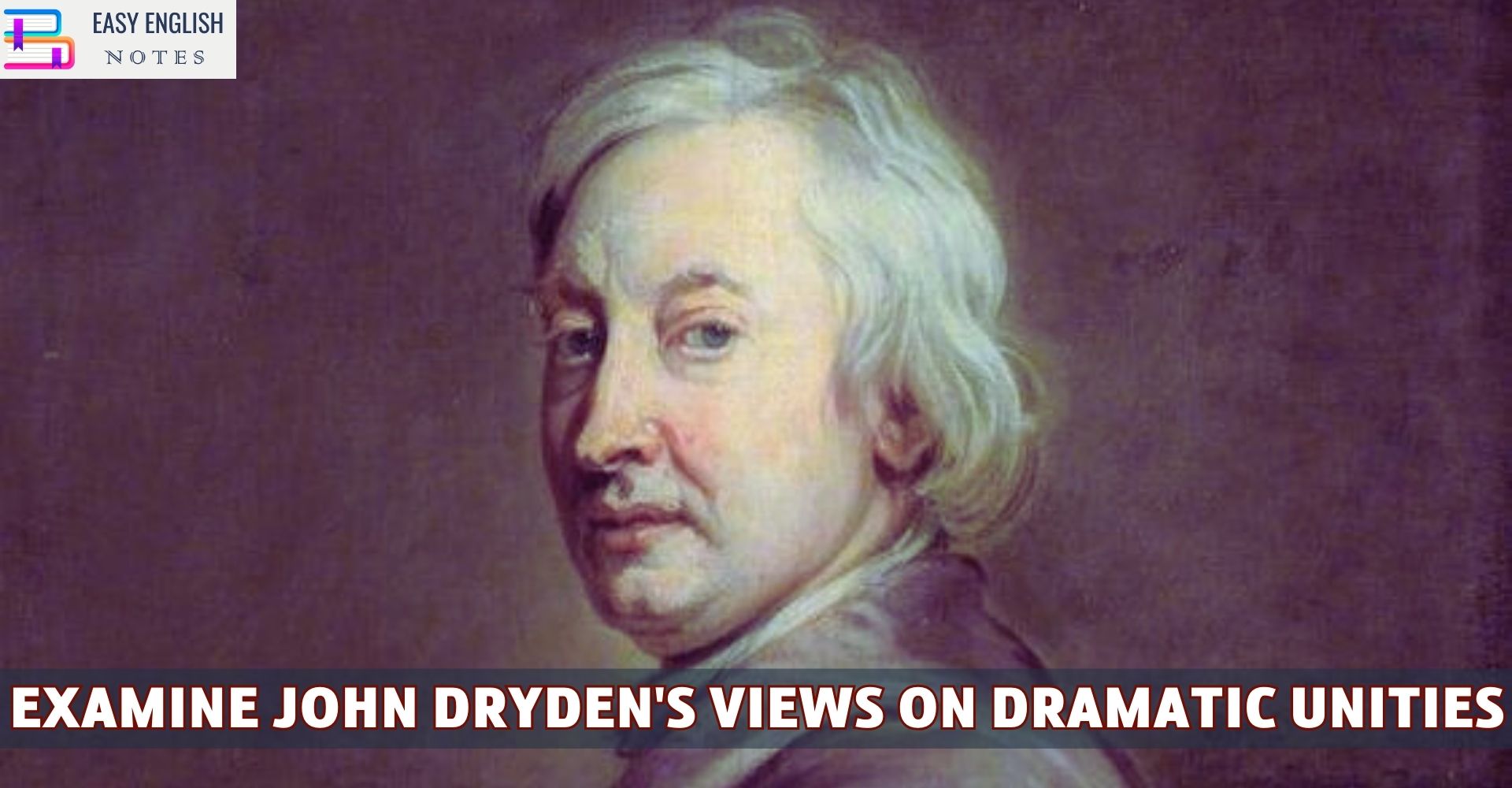John Dryden is a great literary critic in the history of English literature. He has given a new dimension to English literary criticism. He has started a new kind of era of English criticism. That is why, he is called ‘the father of English criticism.”
Dryden has discussed on dramatic unities. This discussion occurs in his defence of the irregular English plays in comparison with regular French drama. In this defence the main point elaborated is the meaning of unity of action, while the unities of time and place are only hinted at in his argument concerning the price which the French have to pay for their observance of the unities.
The plots of the French writers are single. They have only design which is pushed forward by all the actors, every scene in the play contributing and moving towards it. The French plays, besides the main design, have underplots, of less considerable persons and intrigues which are carried on with the emotion of the main plot. As they say the orbit of the fixed stars, and those of planets, though they have motions of their own, are whirled about by the motions of the premium mobile in which they are contained. Thus, if contrary motions seem to agree in nature, they will co-operate in the unity of the great design of play. In this way, the variety, if well ordered in a play will afford a greater pleasure to the audience
The unity of action also involves the unity of tone, which requires the avoidance of the mixture of mirth and passion in the same way. But this mixture, if properly done, is not open to condemnation. If the eye of man can quickly pass from a pleasant scene to an unpleasant one the soul, with its purer and more spiritual substance, cannot reasonably be supposed to fail in similar translation in a play of mixed tone. The old logicians rightly argued that contraries if placed near set off each other. A continued gravity keeps the mind too much bent we must refresh it sometimes to enable it to follow the rest of the story with flagging interest, just as well halt to refresh the body in a stage coach journey that we may go on with great ease.
Also Read :
- Compare Hamlet with Macbeth, Othello and other Tragedies
- “The Pardoner’s Tale” is the finest tale of Chaucer
- Prologue to Canterbury Tales – (Short Ques & Ans)
- Confessional Poetry – Definition & meaning
- Line By Line Explanation Of The Poem The Eve of St. Agnes
Thus, Neander, the mouthpiece of Dryden, concludes that in tragic comedy the English have invented and perfected a wonderful specie of drama. The strict observance of time and place for which the French have often been praised, really produces the barrenness of plot and dearth of character, which Corneille, a celebrated author of the French drama. has dwelt upon in feeling term. The substance of his argument is that by their servile observances of the unities of time, place, and integrity of scenes, the French have brought on themselves that dearth of plot and narrowness of imagination which may be observed in all their plays. How many beautiful accidents may naturally occur in Trio or three-play which cannot arrive with any probability in the compass of twenty four hours. There is time to be allowed also for the maturity of design, which, among the great and prudent persons, such as often are represented in a tragedy. cannot, with any likelihood of truth, be brought to pass at so short a notice.
Further, by tying themselves too much to the unity of place and unbroken scenes, they are forced many times to omit beauties which cannot be shown where the act began, but might arrive at if the scenes were interrupted and the stage cleared for the persons to enter in another place.
The observance of the unity of place often results in absurdities. which are apparent in French plays. If the acts begin in a chamber, all the persons in the play must have some business or other to come there. This forces many odd contrivances on them. A gentleman is going to meet a friend, he sees home with his man coming out of his father’s house. They talk together and the first goes out. The second one who is a lover, has made an appointment with his mistress, she appears at her window and we are to imagine that the scene lies under it. This gentleman is called away and leaves his servant with his mistress. Presently her father is heard from within. The young lady is afraid lest the servant should be discovered and thrusts him into a place of safety which is supposed to be her closet. After this, the father enters the daughter’s house, for he is seeking from one room to another. In this ridiculous manner, the play goes forward, the stage being never empty. All the street, the window, the houses and the closet are made to walk and the persons to stand still.
The conclusion is in favour of the English plays.
“If then the parts are so managed that the beauty of the whole be kept intact so that the variety become not a perplexed and confused mass of accidents, you will find it infinitely pleasing to be led in labyrinth of design, where you see some of your way before you yet discuss not the end till your arrive at it. That all this is practicable can be shown by examples from Johnson and Fletcher.”
Thus, the breach of unities is often again in terms of variety, richness and diversity of character, passion and humour, the lack of which has given the French plays only the beauty of statue.
PLEASE HELP ME TO REACH 1000 SUBSCRIBER ON MY COOKING YT CHANNEL (CLICK HERE)











